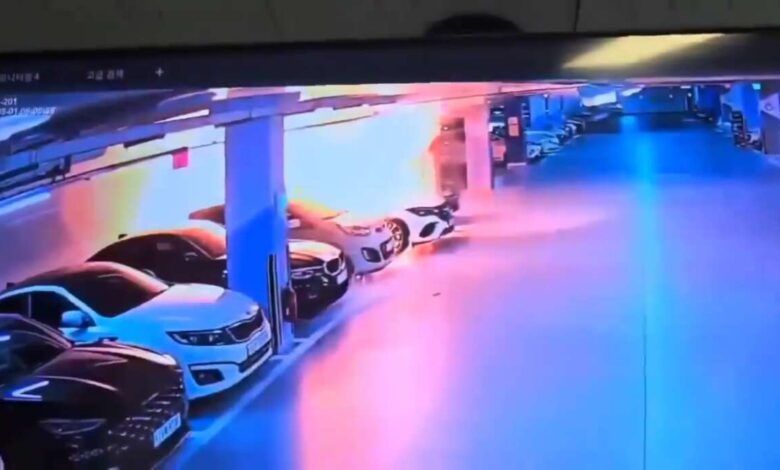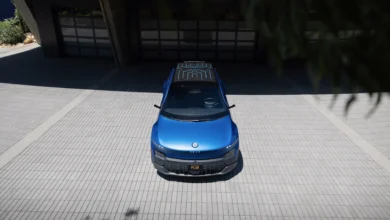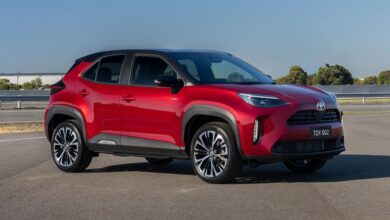South Korean electric car owners angry as Seoul government plans to ban fully charged electric cars from underground parking lots after fire

The The tram fire was widely publicized on August 1. in Incheon, South Korea – where one Mercedes-Benz EQE spontaneously combusted and burned about 140 nearby cars — prompting an immediate response from the Seoul Metropolitan Government. The neighboring capital has announced plans to ban cars charged over 90% from underground parking lots and limit public chargers from charging EVs over 80%.
According to Korea HeraldThe city government will revise its Guidelines for Apartment Management Regulations by the end of September, including a new provision to recommend limiting EV charging to 90 percent or less in underground parking lots. While the provision will not be mandatory, apartments that do not comply could “be excluded from future city-sponsored incentives or support programs,” said Yeo Jang-kwon, head of the Seoul Climate and Environment Headquarters.
The government has proposed that owners set their own car charging limits at 90%. Of course, ensuring public compliance will be difficult, so the authorities are also planning to require carmakers to increase the current safety margin on their electric vehicles – the margin between raw battery capacity and usable battery capacity, typically around 3 to 5% today – to 10%. This would give cars so-called “charge limit certificates”, allowing them to be parked in underground garages.
Starting next month, the government will also impose a charging limit on fast chargers, allowing EV batteries to be charged to 80%. The limit will then be extended to privately installed chargers across Seoul.
Understandably, the move was not well received by Korean electric car owners and experts. Korea JoongAng Daily reported. In response to the city government’s claim that overcharging was one of the main reasons for the battery fires, an energy science professor at Sungkyunkwan University has completely dismissed it, saying that batteries are designed to never be “fully charged.”
“Overcharging is not the dominant factor in fires,” said Professor Yoon Won-sub, who also heads a battery research center jointly run by the university and battery maker Samsung SDI. “Electric vehicles are designed from the start to never be fully charged, even if the dashboard says they are 100% charged. There is an unproven argument that batteries are at higher risk of fire when fully charged.”
Another auto industry source said that while the cathode material of a nickel manganese cobalt (NMC) battery – like the one used in the EQE that caught fire – has a maximum theoretical capacity of 275 mAh, only 210 mAh is typically used in EVs. This establishes the aforementioned safety margin and means that even if a car says it is 100% charged, there is still about 5% of unused capacity.
“We call this difference in charging speed ‘margin’ in establishing the vehicle’s durability,” the source said. “It’s similar to a smartphone that offers a ‘battery protection mode’ that allows charging up to 80% but displays that the battery is fully charged.”
The report pointed out that of the 139 total EV fires that occurred in South Korea over the past three years, only 26 occurred while charging, according to data from the National Fire Agency. Of the remaining, a total of 68 occurred while driving, while 36 started in parked cars.
“It seems like a witch hunt to prevent EV owners with 90 percent charge from entering underground parking lots,” Yoon said. “It is necessary to come up with appropriate countermeasures after thorough discussions among experts.”
Owners are also outraged by the government’s proposal, arguing that such measures infringe on their property rights. The imposition of a charging limit would clearly limit the maximum range of a car – a key factor when buying and using an EV. Netizens also noted the government’s discriminatory treatment of electric and internal combustion engine vehicle fires.
“If a gasoline-powered car catches fire, will the government limit refueling to 90 percent?” a Tesla Model Y owner in Incheon wrote in an online community that is said to represent more than a million electric car owners in South Korea. “I don’t understand how the government came up with numbers like 80 and 90 percent; what proven data is that based on? If it’s so dangerous, why is the government encouraging people to buy electric cars in the first place?”
The community was further outraged when it was discovered that the EQE that caught fire was not charging when the fire started. The exact cause of the fire is still unknown.
The Seoul government’s plans are on track with its national counterpart, led by the Ministry of Environment, which also aims to unveil enhanced EV guidelines as early as next month. Proposals include charging caps, tiered subsidies and forcing EV manufacturers to reveal where they get the batteries.
Looking to sell your car? Sell it with Car.









